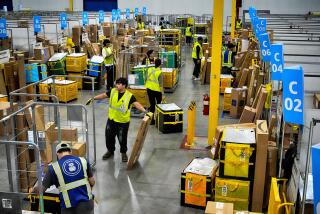Japan Suffers 2nd Quarterly Dip in a Row
- Share via
TOKYO — Japan’s economy declined by 1.4% in the fourth quarter of 1999, as the government spending spree tailed off and the private economy remained weak. Tokyo has spent more than $1 trillion over the past decade with relatively little to show for it, trying to get back into the fast lane.
“The Japanese economy has been a bit like a Frankenstein monster,” said Russell Jones, chief economist with Lehman Bros. Japan. “When you charge it full of electricity, it sits up in bed. But as soon as you turn the power off, it falls back down.”
Technically, this second-consecutive contraction of Japan’s gross domestic product--following a 1% decline in the July-September quarter--means that the world’s second-largest economy has slipped back into a recession. But economists say there are signs that Japan appears to be in a slow recovery mode.
In particular, the data suggest companies are proceeding with painful restructuring plans, investing in automation and information technology, and paring their inefficient distribution systems--all steps necessary in the long term to fuel a turnaround.
“There’s a new will to compete among Japanese companies,” said Jesper Koll, chief economist with Merrill Lynch Japan. “They’re investing in technology and they want to use it or they know they’ll never be competitive again.”
But the process is expected to drag along for some time. Restructuring, particularly in Japan, is a slow process as people are let go through attrition and strong corporate ties are gradually unwound.
In addition, the bulk of Japanese companies have not committed themselves to reform. Economists say for every winning company that seems to be getting it right, there may still be three losers. Even in the United States it took nearly a decade to lay the groundwork for the current robust expansion.
The 1.4% contraction seen in Japan during the October-December quarter, or 5.5% on an annualized basis, is worse than the negative 0.5% to 1% figure most economists expected. That essentially brought Japan’s gross domestic product back to the level of the fourth quarter of 1998.
In early trading today in Tokyo, the dollar rose slightly against the yen to 106.51 yen, up 0.23 yen, while stocks slipped as the Nikkei fell 33.91, or 0.17%, to 19,716.49.
Spending by Japanese consumers during 1999’s fourth quarter remained weak, posting a 1.6% decline as winter bonuses fell sharply. This also likely contributed to the 5.8% drop in spending on housing. As more restructuring takes place and further job cuts follow, consumer spending is expected to remain weak for some time.
“Nothing has changed,” said one 48-year-old insurance company worker in Tokyo, who declined to give his full name. “Restructuring continues at my company, salaries have been cut and I can’t afford to spend anything. Nothing seems to be getting better.”
But some see cause for guarded optimism. Spending by corporations on new machines and other capital items grew by a strong 4.6% during the quarter. “The hot item was the pickup in equipment investments,” said Tetsuro Sugiura, chief economist with Fuji Research.
Taken along with other January data on company spending, rising corporate profit, expanded overtime hours and a small but significant rise in the number of new jobs, economists see signs that the private sector is starting to come alive.
Even traditional industries such as auto manufacturing are spending more on robotics and systems integration, while new Internet companies are finally getting access to capital through new financing channels. And the drive for greater efficiency is slowly forcing a reduction in expensive layers of the Japanese distribution chain and in inefficient subcontractors.
Meanwhile, deflation actually accelerated during the most recent quarter by 1.5% compared with a 0.8% increase the prior quarter.
In the end, Japan is increasingly likely to see a much greater economic divide between innovators and old-guard companies unable to wean themselves from a protected environment.
“Despite the economy, I’m doing very well,” says Shigehisa Fujita, a 52-year-old who recently started his own business selling second-hand designer clothing. “I see very bright prospects ahead.”
Makiko Inoue in the Tokyo bureau contributed to this report.
More to Read
Sign up for Essential California
The most important California stories and recommendations in your inbox every morning.
You may occasionally receive promotional content from the Los Angeles Times.













